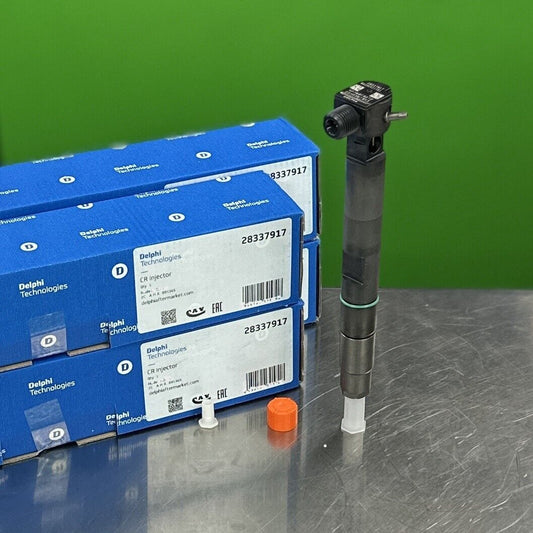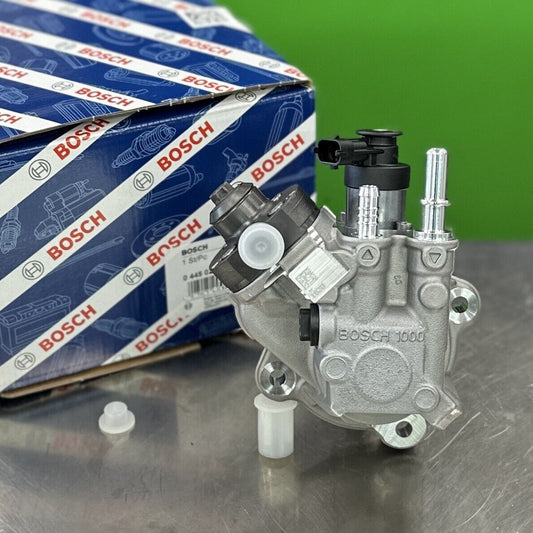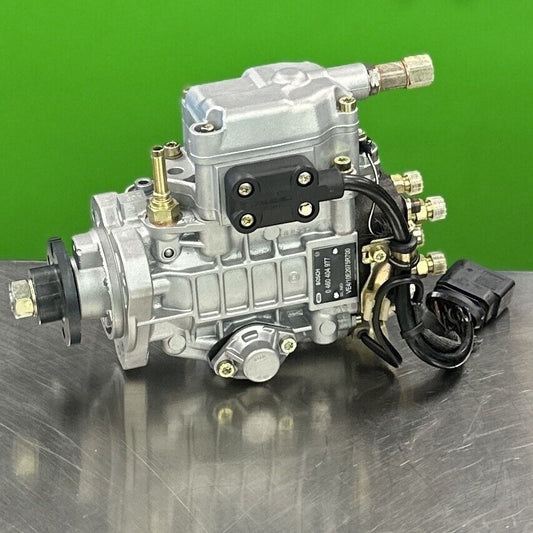How Diesel Engines Are Transforming Commercial Fleets in Illinois
When it comes to the commercial fleet industry in Illinois, the transformation brought about by diesel engines is nothing short of revolutionary. The impact of diesel engines goes far beyond just transportation; it's about efficiency, sustainability, and staying ahead of the curve in a rapidly evolving landscape. These engines have become the backbone of many fleets, powering them to new heights of performance and reliability.
Efficiency of Diesel Engines
When it comes to the efficiency of diesel engines in commercial fleets, there are several key factors to consider. Diesel engines are known for their remarkable fuel efficiency, which directly impacts the overall operational costs of fleet vehicles. These engines have a higher energy density compared to gasoline engines, allowing them to extract more power from each drop of fuel consumed. This translates to longer driving ranges and fewer refueling stops, making diesel-powered vehicles highly efficient for long-haul transportation needs.
In addition to fuel consumption, the power output of diesel engines plays a crucial role in their efficiency. Commercial fleets rely on diesel engines to deliver consistent and robust performance, especially when carrying heavy loads or operating in challenging terrains. The torque provided by diesel engines allows vehicles to accelerate smoothly and maintain speed effortlessly, enhancing overall operational efficiency.
Moreover, the overall performance of diesel engines in commercial fleets is unmatched in terms of durability and reliability. These engines are designed to withstand rigorous use and demanding conditions, ensuring minimal downtime and maximum productivity for fleet operators. The longevity of diesel engines contributes to their efficiency by reducing the frequency of maintenance and replacement, ultimately lowering operational costs in the long run.
When considering the efficiency of diesel engines, it is essential to look beyond just fuel economy and power output. Factors such as durability, reliability, and overall performance play a significant role in determining the efficiency of these engines in commercial fleet operations. By combining fuel efficiency with robust power delivery and long-term reliability, diesel engines continue to transform commercial fleets in Illinois and beyond.
Environmental Considerations
When it comes to environmental considerations, the impact of diesel engines on commercial fleets in Illinois cannot be overlooked. These engines have long been scrutinized for their emissions, with regulations becoming stricter to address air quality concerns. However, advancements in technology have led to significant improvements in reducing harmful pollutants released into the atmosphere.
One of the key aspects of environmental considerations is the adherence to emissions regulations. Diesel engines are now equipped with sophisticated emission control systems that help minimize the release of harmful substances such as nitrogen oxides and particulate matter. Fleet operators in Illinois are increasingly investing in vehicles that meet stringent emission standards to contribute to cleaner air quality in the region.
Moreover, sustainability efforts play a crucial role in mitigating the environmental impact of diesel engines. Fleet managers are incorporating biofuels and alternative energy sources to reduce dependency on traditional diesel fuel. By embracing sustainable practices, commercial fleets are not only reducing their carbon footprint but also setting a positive example for the industry as a whole.
It's essential to consider the overall environmental footprint of diesel engines in commercial fleet operations. While they have traditionally been associated with higher emissions, advancements in engine technology and fuel efficiency are paving the way for a more environmentally friendly future. By embracing these changes and implementing eco-conscious strategies, fleet operators in Illinois can contribute to a cleaner and greener transportation sector.
Cost-Effectiveness in Fleet Operations
When it comes to the cost-effectiveness of utilizing diesel engines in fleet operations, there are several crucial factors to consider. One of the primary advantages is the fuel efficiency of diesel engines, which can lead to significant cost savings over time. Diesel engines are known for their ability to consume fuel more efficiently than gasoline engines, making them a preferred choice for commercial fleets looking to minimize operational costs.
In addition to fuel efficiency, the durability and longevity of diesel engines contribute to their cost-effectiveness in fleet operations. Diesel engines are built to withstand heavy use and high mileage, requiring less frequent repairs and replacements compared to other engine types. This results in lower maintenance costs and longer service life, ultimately translating to savings for fleet operators.
Moreover, the availability and pricing of diesel fuel also play a crucial role in the cost-effectiveness of using diesel engines in commercial fleets. Diesel fuel is often more cost-effective than gasoline, especially in terms of energy content per gallon. This can lead to lower fuel expenses for fleet operations, further enhancing the overall cost-effectiveness of diesel engines.
Furthermore, the resale value of vehicles equipped with diesel engines tends to be higher compared to those with gasoline engines. This can be advantageous for fleet operators looking to upgrade their vehicles or sell older models, as the higher resale value can offset initial investment costs and contribute to long-term savings.
Overall, when considering the total cost of ownership, including fuel efficiency, maintenance costs, fuel prices, and resale value, diesel engines prove to be a cost-effective option for fleet operations in Illinois. By carefully assessing these factors and implementing efficient fleet management practices, businesses can maximize the cost-effectiveness of utilizing diesel engines in their commercial fleets.
Technological Advancements in Diesel Engine Technology
Technological advancements in diesel engine technology have revolutionized the way commercial fleets operate in Illinois. With the constant drive for innovation, diesel engines have evolved to become more efficient, reliable, and environmentally friendly. One of the key advancements in diesel engine technology is the integration of hybrid systems, combining traditional diesel power with electric components to enhance fuel efficiency and reduce emissions. These hybrid systems not only improve the overall performance of commercial vehicles but also contribute to a greener environment by minimizing the carbon footprint.
Moreover, telematics technology has played a crucial role in optimizing fleet management with diesel engines. By utilizing telematics systems, fleet operators can monitor vehicle performance in real-time, track fuel consumption, and schedule maintenance proactively. This data-driven approach allows for better decision-making, improved operational efficiency, and cost savings in the long run. Telematics also enable predictive maintenance solutions, helping to prevent potential breakdowns and ensuring the continuous operation of commercial fleets.
Furthermore, the integration of advanced emission control technologies has significantly reduced the environmental impact of diesel engines in Illinois. With stringent emissions regulations in place, diesel engine manufacturers have developed innovative solutions such as selective catalytic reduction (SCR) and diesel particulate filters (DPF) to minimize harmful pollutants released into the atmosphere. These technologies not only ensure compliance with environmental standards but also contribute to cleaner air quality and sustainable fleet operations.
In addition to enhancing performance and reducing emissions, technological advancements in diesel engine technology have focused on improving driver comfort and safety. Features such as adaptive cruise control, lane departure warning systems, and collision mitigation technology have become standard in modern commercial vehicles equipped with diesel engines. These safety innovations not only protect drivers and passengers but also enhance overall fleet efficiency by reducing the risk of accidents and downtime.
Future Trends and Adoption of Diesel Engines
As we look ahead to the future of commercial fleets in Illinois, the adoption of diesel engines is expected to continue evolving at a rapid pace. One of the key trends on the horizon is the integration of more advanced emission control technologies to meet stringent environmental regulations. These technologies aim to reduce harmful pollutants and enhance the overall sustainability of diesel engines in commercial operations.
Furthermore, the adoption of alternative fuel sources, such as biodiesel and renewable diesel, is projected to gain traction in the coming years. These eco-friendly fuel options offer a cleaner burning alternative to traditional diesel, aligning with the industry's growing emphasis on reducing carbon emissions and promoting a greener transportation sector.
Moreover, the rise of electric and hybrid diesel engine systems is set to revolutionize the commercial fleet industry. By combining the efficiency of diesel power with the environmental benefits of electric propulsion, hybrid systems offer a compelling solution for fleet operators looking to enhance both performance and sustainability.
Another significant trend shaping the future adoption of diesel engines is the integration of advanced telematics and predictive maintenance solutions. These innovative technologies enable fleet managers to monitor engine performance in real-time, optimize maintenance schedules, and prevent potential breakdowns, ultimately increasing operational efficiency and reducing downtime.
Looking ahead, the continued development of autonomous vehicle technology is poised to transform the landscape of commercial fleets utilizing diesel engines. Autonomous diesel-powered vehicles offer the potential for increased safety, efficiency, and productivity, paving the way for a new era of transportation innovation in Illinois and beyond.
Frequently Asked Questions
-
Are diesel engines more fuel-efficient than gasoline engines?
Diesel engines are known for their superior fuel efficiency compared to gasoline engines. Due to the higher energy density of diesel fuel, diesel engines can travel longer distances on less fuel, making them a cost-effective choice for commercial fleets.
-
Do diesel engines produce more harmful emissions than gasoline engines?
While diesel engines traditionally produced more emissions than gasoline engines, advancements in technology have significantly reduced their environmental impact. Modern diesel engines are equipped with emissions control systems that help minimize harmful pollutants, making them more environmentally friendly.
-
Are diesel engines more expensive to maintain than gasoline engines?
Initial purchase costs of diesel engines may be higher than gasoline engines, but they often have lower maintenance costs in the long run. Diesel engines are built to be more durable and reliable, requiring less frequent maintenance and resulting in potential savings over time.
-
What are the key technological advancements in diesel engine technology?
Technological advancements in diesel engine technology include the integration of hybrid systems, which combine diesel power with electric propulsion for increased efficiency. Telematics systems provide real-time data on engine performance, while predictive maintenance solutions help prevent breakdowns and optimize fleet operations.
-
How is the adoption of diesel engines expected to evolve in the future?
The future of diesel engines in commercial fleets is likely to see continued innovation and development. Challenges such as stricter emissions regulations may drive further improvements in engine efficiency and emissions control. Opportunities for growth in sustainable transportation solutions could also shape the adoption of diesel engines in the future.



